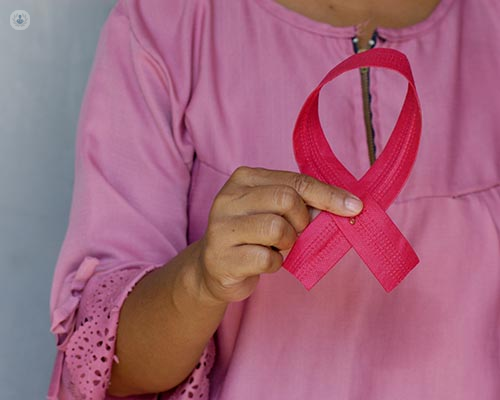Advanced breast cancer: everything you need to know
Escrito por:Leading consultant medical oncologist Dr Mark Tuthill explains everything you need to know about advanced breast cancer, including the symptoms and diagnosis and provides tips on lifestyle changes which can help manage advanced breast cancer.

What are the symptoms of advanced breast cancer?
Advanced breast cancer can be diagnosed on the basis of symptoms that can rise as a result of complications from the cancer in the body. One key symptom is shortness of breath, which could indicate lung involvement, potentially causing conditions like pleural effusion. Patients may also notice lumps in the breast or armpit, or experience bony pains.
In some cases, symptoms are discovered incidentally during medical investigations, such as mammograms or tests for other concerns, revealing the presence of breast cancer.
How is advanced breast cancer diagnosed?
The primary method for diagnosing advanced breast cancer involves consulting a medical professional, typically starting with a GP or specialist referral. To determine the type of breast cancer, a biopsy is often conducted, sampling the abnormal area with a needle or similar technique. Scans such as CT, MRI, PET, or bone scans are commonly performed, along with clinical examinations, to confirm the diagnosis.
Additional tests may include blood tests, including tumour marker analysis like CA-153. In some cases, DNA sequencing of blood or tumour samples is utilised to guide medical treatment decisions for breast cancer.
What are the treatment options for advanced breast cancer?
Effective treatments for advanced breast cancer are increasing. For hormone receptor-positive, HER2-negative cases, hormone therapy is usually the initial approach. Options may include aromatase inhibitors or fulvestrant, often combined with CDK4/6 inhibitors like ribociclib, abemaciclib, or palbociclib. Subsequent treatments may target specific mutations or involve targeted chemotherapy.
For triple-negative breast cancer, treatment depends on the tumor's immune status. Immunotherapy with pembrolizumab or atezolizumab, often with chemotherapy, is recommended if the tumour is immune-activated (PDL1 expression). Otherwise, standard chemotherapy may be offered.
If signs of spread persist after initial treatment, combination immunotherapy and chemotherapy may be administered. HER2-positive breast cancer is typically treated with chemotherapy plus targeted therapy like trastuzumab and pertuzumab. Other options include antibody-drug conjugates like trastuzumab deruxtecan.
Highly effective treatments are available for each subtype of advanced breast cancer. Consulting with a specialist is crucial for personalized treatment recommendations tailored to your specific condition and stage in your cancer journey.
What is the prognosis for advanced breast cancer?
The prognosis of advanced breast cancer varies widely based on the specific type of cancer and how it responds to treatment. Many patients with HER2-positive or hormone receptor-positive breast cancer can expect to live for five years or more after diagnosis. While triple-negative breast cancer may have a more uncertain outlook, some patients achieve long-term survival with effective immunotherapy.
It's essential to recognise that individual responses to treatment differ, so discussing your prognosis with your specialist is crucial. They can provide personalised guidance tailored to your unique situation. Conversations about prognosis can be challenging, and it's okay to take your time discussing them with your healthcare team.
What lifestyle changes can help manage advanced breast cancer symptoms and improve quality of life?
When facing a diagnosis of advanced breast cancer, it's crucial for individuals to reassess their priorities for themselves and their loved ones. This diagnosis marks a significant moment for reflection on what truly matters in life and how to make the most of the time while dealing with secondary breast cancer. While there's often a tendency to blame lifestyle choices for the situation, the risk of breast cancer recurrence is largely independent of one's lifestyle.
Nevertheless, maintaining a normal, balanced diet rich in fresh produce and diverse food groups is advised, while minimising consumption of heavily processed foods that may impact treatment response, especially immunotherapy. Regular exercise, even if it's just moderate activities like walking, is also encouraged for overall well-being. It's important for patients to care for themselves while not sacrificing the activities that bring them joy and fulfilment.
If you are facing breast cancer and would like to book a consultation with Dr Tuthill, do not hesitate to do so by visiting his Top Doctors profile today.


